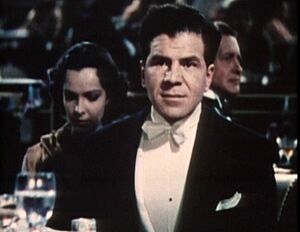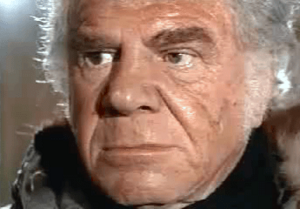Lionel Stander facts for kids
Quick facts for kids
Lionel Stander
|
|
|---|---|

Stander in A Star Is Born (1937)
|
|
| Born |
Lionel Jay Stander
January 11, 1908 New York City, U.S.
|
| Died | November 30, 1994 (aged 86) Los Angeles, California, U.S.
|
| Occupation | Actor |
| Years active | 1928–1994 |
| Spouse(s) |
Lucy Dietz
(m. 1928; div. 1936)Alice Twitchell
(m. 1938; div. 1942)Vehanne Monteagle
(m. 1945; div. 1950)Diana Radbec
(m. 1953; div. 1963)Maria Penn
(m. 1963; div. 1967)Stephanie Van Hennick
(m. 1971) |
| Children | 6 |
Lionel Jay Stander (January 11, 1908 – November 30, 1994) was an American actor, activist, and a founding member of the Screen Actors Guild. He had an extensive career in theatre, film, radio, and television that spanned nearly 70 years, from 1928 until 1994. One of the first Hollywood actors to be subpoenaed before the House Un-American Activities Committee, he was blacklisted from the late 1940s until the mid-1960s.
Following his experience with the Hollywood Blacklist, Stander moved to Europe, where he appeared in many genre films, including several Spaghetti Westerns. He returned to the United States later in the decade, playing the role of the majordomo Max on the 1980s mystery television series Hart to Hart, earning him a Golden Globe Award for Best Supporting Actor – Series, Miniseries or Television Film.
Contents
Early life
Stander was born in The Bronx, New York City on 11 January 1908, to parents of Russian Jewish extraction.
During his one year at the University of North Carolina at Chapel Hill, he appeared in the student productions The Muse of the Unpublished Writer, and The Muse and the Movies: A Comedy of Greenwich Village.
Career
Stander's acting career began in 1928, as Cop and First Fairy in Him by E. E. Cummings, at the Provincetown Playhouse. He appeared in a series of short-lived plays through the early 1930s, including The House Beautiful.
Early film roles
Like many New York-based stage actors, Stander found additional work in movie short subjects filmed in New York. He signed with Vitaphone and was featured (without screen credit) in the two-reel comedy In the Dough (1933), with Roscoe Arbuckle and Shemp Howard. He made several other Vitaphone comedies, usually as a comic tough guy, villain, or authority figure; his last Vitaphone short was The Old Grey Mayor (1935) with Bob Hope in 1935. That same year, he was cast in a feature, Ben Hecht's The Scoundrel (1935), with Noël Coward. He moved to Hollywood and signed a contract with Columbia Pictures. Stander was in a string of films over the next three years, appearing most notably in Frank Capra's Mr. Deeds Goes to Town (1936) with Gary Cooper, Meet Nero Wolfe (1936) playing Archie Goodwin, The League of Frightened Men (1937), and A Star Is Born (1937) with Janet Gaynor and Fredric March.
Radio roles
Stander's distinctive rumbling voice, tough-guy demeanor, and talent with accents made him a popular radio actor. In the 1930s and 1940s, he was on The Eddie Cantor Show, Bing Crosby's KMH show, the Lux Radio Theater production of A Star Is Born, The Fred Allen Show, the Mayor of the Town series with Lionel Barrymore and Agnes Moorehead, Kraft Music Hall on NBC, Stage Door Canteen on CBS, the Lincoln Highway Radio Show on NBC, and The Jack Paar Show, among others.
In 1941, he starred in a short-lived radio show called The Life of Riley on CBS (no relation to the radio, film, and television character later made famous by William Bendix). Stander played the role of Spider Schultz in both Harold Lloyd's film The Milky Way (1936) and its remake ten years later, The Kid from Brooklyn (1946), starring Danny Kaye. He was a regular on Danny Kaye's zany comedy-variety radio show on CBS (1946–1947), playing himself as "just the elevator operator" amidst the antics of Kaye, future Our Miss Brooks star Eve Arden, and bandleader Harry James.
Also during the 1940s, he played several characters on The Woody Woodpecker and Andy Panda animated theatrical shorts, produced by Walter Lantz Productions. For Woody Woodpecker, he provided the voice of Buzz Buzzard, but was blacklisted from the Lantz studio in 1951 and was replaced by Dal McKennon.
Activism
Stander espoused a variety of social and political causes, and was a founding member of the Screen Actors Guild. At a SAG meeting held during a 1937 studio technicians' strike, he told the assemblage of 2000 members: "With the eyes of the whole world on this meeting, will it not give the Guild a black eye if its members continue to cross picket lines?" (The NY Times reported: "Cheers mingled with boos greeted the question.") Stander also supported the Conference of Studio Unions in its fight against the Mob-influenced International Alliance of Theatrical Stage Employees (IATSE). Also in 1937, Ivan F. Cox, a deposed officer of the San Francisco longshoremen's union, sued Stander and a host of others, including union leader Harry Bridges, actors Fredric March, Franchot Tone, Mary Astor, James Cagney, Jean Muir, and director William Dieterle. The charge, according to Time magazine, was "conspiring to propagate Communism on the Pacific Coast, causing Mr. Cox to lose his job".
During the Spanish Civil War, Stander fundraised for the Republican cause, and later campaigned for the release of the Scottsboro Boys. He was a member of the Popular Front from 1936 until 1939, and later the Hollywood Anti-Nazi League. Regarding his political beliefs, Stander later described himself as "lefter than the Left" and supported the Communist Party USA prior to the Molotov–Ribbentrop Pact (which he opposed), though he was never a registered member of the party nor considered himself one.
Stander and HUAC
Stander was among the first group of Hollywood actors to be subpoenaed before the House Un-American Activities Committee (HUAC) in 1940 for supposed Communist activities. After that, Stander was blacklisted from TV and radio. He continued to act in theater roles, and played Ludlow Lowell in the 1952-53 revival of Pal Joey on Broadway and on tour.
Blacklisting
Two years passed before Stander was issued the requested subpoena. Finally, in May 1953, he testified at a HUAC hearing in New York, where he made front-page headlines nationwide by being uproariously uncooperative, memorialized in the Eric Bentley play, Are You Now or Have You Ever Been.
Stander denied having been a Communist "now or yesterday." But when asked if he had ever been a party member, he refused to answer, calling it "a trick question."
Stander was blacklisted from the late 1940s until 1965; perhaps the longest period.
Career in independent films in Europe
After that, Stander's acting career went into a free fall. He worked as a stockbroker on Wall Street, a journeyman stage actor, a corporate spokesman—even a New Orleans Mardi Gras king. He didn't return to Broadway until 1961 (and then only briefly in a flop) and to film in 1963, in the low-budget The Moving Finger (although he did provide, uncredited, the voice-over narration for the 1961 film noir Blast of Silence.)
Life improved for Stander when he moved to London in 1964 to act in Bertolt Brecht's Saint Joan of the Stockyards, directed by Tony Richardson, for whom he'd acted on Broadway, along with Christopher Plummer, in a 1963 production of Brecht's The Resistible Rise of Arturo Ui. In 1965, he was featured in the film Promise Her Anything. That same year Richardson cast him in the black comedy about the funeral industry, The Loved One, based on the novel by Evelyn Waugh, with an all-star cast including Jonathan Winters, Robert Morse, Liberace, Rod Steiger, Paul Williams and many others. In 1966, Roman Polanski cast Stander in his only starring role, as the thug Dickie in Cul-de-sac, opposite Françoise Dorléac and Donald Pleasence.
Stander stayed in Europe and eventually settled in Rome, where he appeared in many spaghetti Westerns, most notably playing a bartender named Max in Sergio Leone's Once Upon a Time in the West. He played the role of the villainous mob boss in Fernando Di Leo's 1972 poliziottesco thriller Caliber 9. In Rome he connected with Robert Wagner, who cast him in an episode of It Takes a Thief that was shot there. Stander's few English-language films in the 1970s include The Gang That Couldn't Shoot Straight with Robert De Niro and Jerry Orbach, Steven Spielberg's 1941, and Martin Scorsese's New York, New York, which also starred De Niro and Liza Minnelli.
Stander played a supporting role in the TV film Revenge Is My Destiny with Chris Robinson. He played a lounge comic modeled after the real-life Las Vegas comic Joe E. Lewis, who used to begin his act by announcing "Post Time" as he sipped his ever-present drink.
Hart to Hart and other roles
After 15 years abroad, Stander moved back to the U.S. for the role he is now most famous for: Max, the loyal butler, cook, and chauffeur to the wealthy, amateur detectives Jonathan and Jennifer Hart played by Robert Wagner and Stefanie Powers on the 1979–1984 television series Hart to Hart (and a subsequent series of Hart to Hart made-for-television films). In 1982, Stander won a Golden Globe Award for Best Supporting Actor – Series, Miniseries or Television Film.
In 1986, he became the voice of Kup in The Transformers: The Movie. In 1991 he was a guest star in the television series Dream On, playing Uncle Pat in the episode "Toby or Not Toby". His final theatrical film role was as a dying hospital patient in The Last Good Time (1994), with Armin Mueller-Stahl and Olivia d'Abo, directed by Bob Balaban.
Personal life and death
Stander died of lung cancer in Los Angeles, California, in 1994 at age 86.
See also
 In Spanish: Lionel Stander para niños
In Spanish: Lionel Stander para niños


